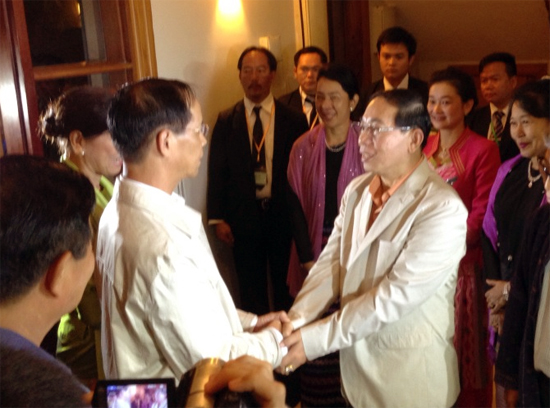Sao Yawdserk, leader of the Restoration Council of Shan State/Shan State Army (RCSS/SSA), at the planned meeting today with Vice President Sai Mawk Kham in Naypyitaw, has warned there be no more pretexts by the Burma Army to violate the ceasefire signed almost 21 months earlier.
His message was conveyed through Col Sai La, the RCSS/SSA representative who is in Naypyitaw to discuss the Nationwide Ceasefire Agreement proposal by the government’s Union Peacemaking Work Committee (UPWC), chaired by the Vice President.
The three vice chairmen:
Vice Senior General Soe Win, representing the military
U Aung Min, representing the government
U Thein Zaw, representing the Parliament
are also expected to be present at the meeting.
The two sides have already fought more than 100 clashes since December 2011, when the state level ceasefire agreement was signed.

“Ceasefire does not mean only we (the RCSS/SSA) should stop fighting,” he told SHAN. “It means the Tatmadaw (Burmese military) must stop too. There should be no pretext whatsoever to launch operations against us. The ceasefire should not be used as a tactical military move to outfox each other.”
President Thein Sein, in response to the question posed by BBC on 18 July, why there were so many clashes despite the ceasefire, had replied that the reason was the resistance movements were collecting taxes from the people.
Yawdserk says he has nothing against a nationwide ceasefire agreement, to be witnessed by international celebrities such as UN Secretary General Ban Ki-Moon. “But prior informed consent must be obtained through informal discussions before it is signed,” he said.
The two sides should also stop claiming territories and use it as a excuse to violate the ceasefire. “If the Tatmadaw keeps on insisting its right to control every Union territory while the SSA goes on saying it has the right to defend the Shan State and its people and neither is budging an inch from its position, then we have no way out but to resume fighting,” he said. “We should therefore seek a middle course, where each side gives up some of its claims. Only then we can move on toward a political dialogue.”
Concerning the question of taxation by the resistance, he said the two sides need to discuss the matter before an acceptable solution is reached. “There was no discussion on the matter during the previous meetings,” he added.
The transitional arrangements proposed by the Working Group for Ethnic Coordination (WGEC), set up in 2012 by the armed resistance movements, have called for their access to resources through either tax collection, business activities, aid from government or international donors, or revenue sharing from mega projects in their territories.
The ethnic delegation participating in today’s meeting with the UPWC is reportedly made up of representatives from Chin National Front (CNF), Karen National Union (KNU) and the RCSS.



